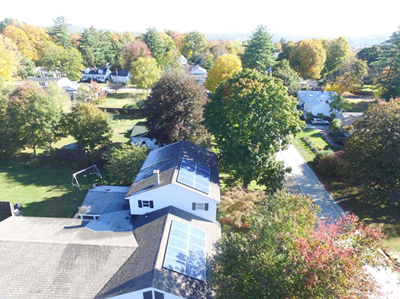Solar Permitting and Approvals
The Keene Community Development Department is committed to providing exceptional customer service. To promote the advancement of solar in our community, we are committed to the following:
- Providing clear guidelines about the solar permitting and inspection process.
- Providing a convenient online application and fillable PDF application.
- Processing small rooftop solar PV permit applications within three business days.
- Offering inspection appointment times for solar projects (instead of appointment windows). To schedule an inspection, call (603) 352-5440.
Ready to submit a building permit? Apply online, download a fillable PDF, or pick up an application from the fourth floor of City Hall.

Rooftop Solar Energy Systems
Where are rooftop solar energy systems allowed?
In Keene, all rooftop solar is classified as an “accessory use” and is allowed by right in all areas / zoning districts of the city. For more information about roof-mounted solar energy systems, please see Section 8.4.2.F of the Land Development Code.
What local permits/approvals are required?
A building permit is required for all solar energy systems and additional approvals (such as administrative planning review and/or Historic District Commission review) may be required depending on the location of your property, the type of use (e.g., commercial, residential, etc.) and whether the system will be visible from a public right-of-way. For more information, please view the resources below or contact Community Development staff.
Resources:
Commercial Solar Permit Checklist (for commercial or multi-family properties).
Rooftop Solar PV Flowchart (to figure out what approvals may be required).
Residential Solar Permit Checklist (for single-family or two-family properties)
Accessory Ground-Mounted Solar Energy Systems
What is an “accessory ground-mounted solar energy system”?
Accessory ground-mounted solar energy systems are defined as “A solar energy system and associated mounting hardware that is either affixed to or placed upon the ground, and occupies 2,000-sf of solar footprint or less, and is accessory to a principal use, which is located on the same lot.”
Where are accessory ground-mounted solar energy systems allowed?
This use is allowed in all areas / zoning districts of the city with the following use standards, which are detailed in the Land Development Code, Section 8.4.2.G:
“a. The height of ground-mounted solar energy systems that are accessory to the principal use shall not exceed 15-ft, as measured from the natural grade at the base of the system to the highest point of the system, when oriented at maximum design tilt.
b. Accessory small-scale ground-mounted solar energy systems shall comply with the setback and lot coverage requirements of the underlying zoning district.”
What local permits/approvals are required?
A building permit is required for all solar energy systems, and additional approvals (such as administrative planning review and/or Historic District Commission review) may be required depending on the location of your property, the type of use (e.g. commercial, residential, etc.), and whether the system will be visible from a public right-of-way. Contact planning staff to identify required approvals.
Resources:
Commercial Solar Permit Checklist (for commercial or multi-family properties).
Residential Solar Permit Checklist (for single-family or two-family properties)
Ground Mounted Solar Energy Systems (Principal Use)
What is a ground-mounted solar energy system (principal use)?
The Land Development Code defines a solar energy system as “An energy system that consists of one or more devices and/or structural design features, and other associated infrastructure, which provides for the collection of solar energy for electricity generation, consumption, storage, or transmission, or for thermal applications.”
Ground-mounted solar energy systems fall into three categories:
- Small-Scale: occupies 2,000-sf of solar footprint or less.
- Medium-Scale: occupies greater than 2,000-sf and less than 1-acre of solar footprint.
- Large-Scale. occupies 1-acre or more of solar footprint.
Where are ground-mounted solar energy systems allowed as a principal use?
Table 8-1 “Permitted Principal Uses by Zoning District” of the Land Development Code lists the districts where solar energy systems are permitted as a principal use. In general, small-scale solar energy systems are permitted by right (subject to use standards), whereas medium-scale and large-scale solar are generally permitted by conditional use permit. The table below summarizes the districts where this use is allowed.
| Use | R | DT-E | DT-I | COM | CL | BGR | CP | I | IP | HC |
|---|---|---|---|---|---|---|---|---|---|---|
| Solar Energy System (small-scale) | P1 | P1 | P1 | P1 | P1 | P1 | P1 | P1 | P1 | P1 |
| Solar Energy System (medium-scale) | CUP | – | CUP | CUP | CUP | CUP | CUP | P1 | CUP | CUP |
| Solar Energy System (large-scale) | CUP | – | – | – | – | CUP | CUP | P1 | CUP | – |
What local permits/approvals are required?
A building permit is required for all solar energy systems, and additional approvals (such as a solar energy system conditional use permit and site plan review) may be required depending on the location of your property and size of the system. Contact planning staff to identify required approvals.
Resources
Commercial Solar Permit Checklist (for commercial or multi-family properties).

